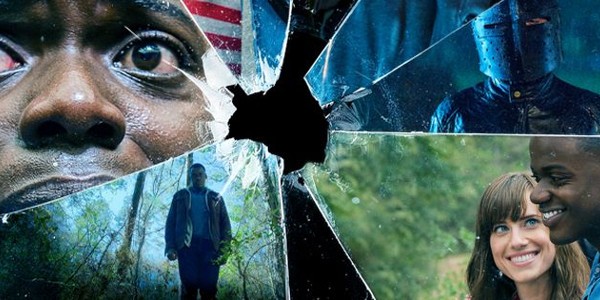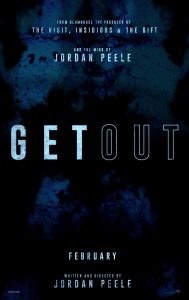As a horror movie, Jordan Peele’s Get Out is neither scary nor shocking, despite a couple of cheap make-you-jump moments early on in the proceedings and some half-hearted gruesomeness at the end.
As a satire of liberal white America’s attitudes toward black America, Get Out is lacerating, surreal, and at times laugh-out-loud funny. Fortunately, the movie is more satire than horror. Still, it’s too bad that Peele, a horror movie maven, was so fixated on making a contribution to his favorite genre because his sense of the absurd is sharp and innate while his sense of the horrific is secondhand. When I think about how many of the skits in Key & Peele are subversions of genre fiction—action, vampires, science fiction, fantasy, etc.—I’m all the more amazed by how paint-by-numbers Peele’s approach to horror is here. Get Out is merely a pastiche of horror movies. The satire is genuine.
Chris Washington (Daniel Kaluuya), a photographer in New York City, heads upstate with his girlfriend, Rose Armitage (Allison Williams), to meet her parents for the first time. The occasion is the Armitage’s annual (spring?) party. Rose is white. Chris is black. He’s worried about how the Armitages will respond to their daughter’s significant other’s being the Other. She tells him not to worry. Her parents are the height of enlightened. “My father would have voted for Obama a third time if he could have,” she says with a straight face.
Most of Get Out’s many gags about liberal white America are based on the return of the repressed. Not for nothing is Rose’s mother, Missy (Catherine Keener), a psychiatrist. Every time Dean Armitage (Bradley Whitford) opens his mouth, he reveals unconscious biases that seethe just below his self-possessed surface. So too with all of the Armitages’ well-heeled, impeccably progressive friends. One of them, a fashion designer, declares, “Black is the new cool.” Another, a retired golf pro, insists with just a jot too much enthusiasm that Tiger Woods is the greatest golfer of all time. As the gags accumulate, the enormity of the repressed element becomes more and more obvious.
Actually, though, the repression in Get Out is a sham. The white folks in this movie are up to something, and they’re countless, all too insistent expressions of good will toward Chris, along with their heartfelt sympathy for the black experience, are deliberate untruths. The difference between these hip, educated white people, and the hip, educated white people of America at large is that the ones in the movie know they’re lying and why. They’re lying to Chris, not to themselves.
So what do the Armitages and their peers want? That’s the question at the heart of Get Out, the question that Chris himself plaintively asks: “What do you want from me?” The movie’s answer to this question is admirably direct. White people want black bodies. They want to be as strong, as athletic, and as graceful as black people. They want to be as beautiful and healthy as black people. They want to be as comfortable in their own skin. White people aren’t truly averse to people with brown complexions. Given the chance, your typical liberal bourgeois white American would happily inhabit a black body—as long as he could keep his “disciplined” white mind.
It’s a nice touch that Chris is the least threatening character in the film. White fear of black aggression goes hand in hand with, in fact probably arises from, white obsession with the black body. If Chris were a fighter, which he has no trouble admitting he isn’t, he’d be a type straight out of the white imagination. Instead, he’s the film’s only real thinker—until the end, anyway.
In the final act, alas, Get Out suddenly remembers that it’s supposed to be a horror movie, and the generic convention that Peele decided to go with is the one that requires the hero to become as savage as his tormentors in order to survive and escape. In a different movie, this might not be so disheartening. The conventions of horror are part of what we go to horror movies for in the first place. But Get Out isn’t just a horror movie. It’s a sociological comedy with cunningly intelligent purpose. And in a movie about the ridiculous ways that white people imagine black people, can a black man committing bloody atrocities against his white captors, under whatever circumstances, manage more than a pyrrhic victory?


